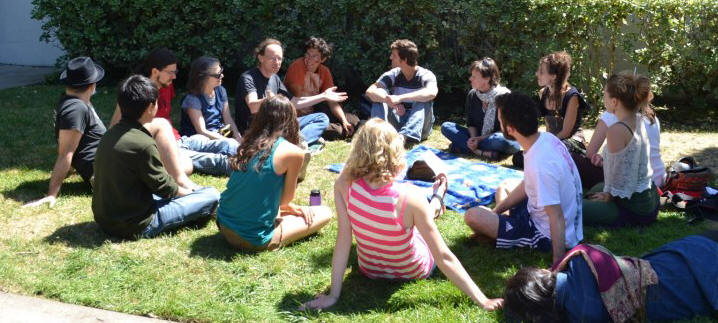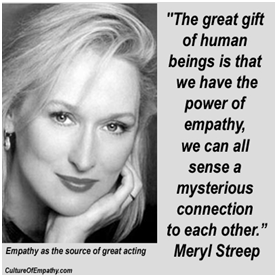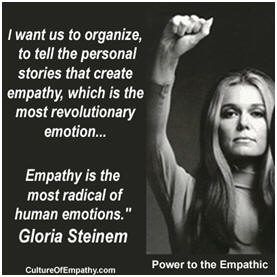|
|
|
Empathy
Tent > UC Berkeley
>
Empathic Listening and Empathy Circle Practice
"...the
research evidence keeps piling up, and it points strongly to the
conclusion that a high degree of empathy in a relationship is possibly
the most potent and certainly one of the most potent factors in bringing
about change and learning." Carl Rogers
An empathy
circle is an opportunity to nurture, practice and deepen empathy with
ourselves and others in an environment where we specifically intend to
cultivate a global culture of empathy. Deeper empathy has many benefits;
it fosters learning, connection, social change, reduces stress and
supports sustainable collaborative action, transforms conflict, it
fosters resilience, as well as builds trust and heals.
How to do Empathic Listening
The foundation of empathy circles is to empathically listen to each
other. You can start practicing listening with just one other person.
Later you can add more people to the circle. We begin with a question
like, “How can we work together to create more empathy in ourselves and
the world?””
Sitting across from each other, the first person speaks about
whatever comes up for them. The listener reflects back what they are
hearing, until the speaker feels heard to their satisfaction. Then it
is the listeners turn to speak and the other person to reflect back what
they are hearing. The dialog continues back and forth like this. Tips · As speaker, pause often to give the listener a chance to reflect back what they heard. · remember that you are guiding the listener in how to hear you to your satisfaction. · when you are done talking, you can say something like, “I’m fully heard” to indicate that you are done and it’s the listeners turn to speak. · As listener, just reflect back, summarize, paraphrase, etc. what you hear as best you can. There is no right-wrong here. No worry about getting it right, the speaker can just say it again.
·
While it’s the speakers turn to talk, refrain from asking
questions, judging, analyzing, detaching, diagnosing, advising or
sympathizing. When it’s your turn to speak, you can say whatever you
want. With this basic process, you can start creating larger circles and add other empathy building exercises. Visit our website for more about how to take part in and host circles in-person or online. http://cultureofempathy.com/Projects/Empathy-Movement/
Quotes
The biggest deficit that we have in our society and in the world right
now is an empathy deficit. We are in great need of people being able to
stand in somebody else's shoes and see the world through their eyes.
Listening is a very deep practice…You have to empty yourself. You have to leave space in order to listen…especially to people we think are our enemies… Thich Nhat Hanh In empathic listening you listen with your ears, but you also, and more importantly, listen with your eyes and with your heart. You listen for feeling, for meaning. You listen for behavior. You use your right brain as well as your left. You sense, you intuit, you feel... You have to open yourself up to be influenced… Empathic listening is so powerful because it gives you accurate data to work with. Instead of projecting your own autobiography and assuming thoughts, feelings, motives and interpretation, you're dealing with the reality inside another person's head and heart. You're listening to understand. You're focused on receiving the deep communication of another human soul. Stephen R. Covey When a person realizes he has been deeply heard, his eyes moisten. I think in some real sense he is weeping for joy. It is as though he were saying, “Thank God, somebody heard me. Someone knows what it's like to be me”. Carl Rogers So it's empathy that makes us connect to other people. It's empathy that makes us help other people. It's empathy that makes us moral. Paul Zak, The Moral Molecule
“Empathy is a universal solvent. Any problem immersed in empathy
becomes soluble.” When someone has listened to you, you go home rested and lighthearted. It is when people really listen to us, with quiet fascinated attention, that the little (creative) fountain begins to work again, to accelerate in the most surprising way. Brenda Ueland Empathy is a quality of character that can change the world.” Barack Obama
|
|
|
||||








